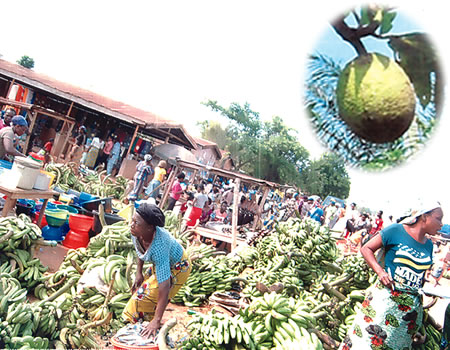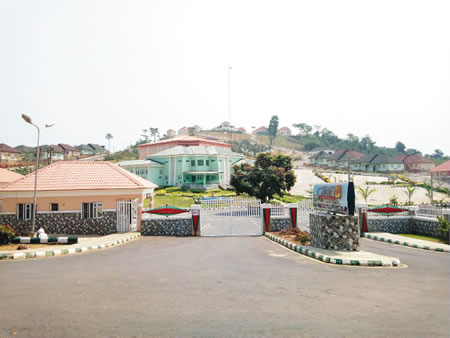Navigating Ifewara in Osun State that Tuesday was a bit difficult. It was the town’s market day and human and vehicular traffic to Oja Ife, the oldest market, was chaotic, so to say. TADE MAKINDE, in this report, speaks on the history and traditions of the fewer than 8,000 resident-town that has produced several great Nigerians.
YOU may not find Ifewara in your old geography text book, but thank God for Google map, it could now be located with precision. It may not be a famous town, but it is a real town with real people: several of them famous people. Ifewara is the headquarters of Atakunmosa Local Government Area of Osun State, Nigeria, just few kilometers from Ilesha.
From historical accounts, Ifewara was founded by people from Ile-Ife, believed to be the source of the entire Yoruba race. Ifewara was also the name of the founder of the town, who was the elder brother of the traditional ruler of Ile-Ife at the time.
According to Alhaji Obabiolorunkosi (aka Baba Bello), until recently the oldest person in Ifewara at the age of 140 years, who spoke with Sunday Tribune just before his demise said, a prince who founded Ifewara was supposed to ascend the throne of his forefathers after the demise of the then ruler of Ile-Ife, but because he was not living in Ife then, (he was a farmer in another town) he sent his younger brother to the kingmakers of the town to enquire from them, on his behalf, the materials that would be needed for his installation.
As the story goes, on getting to the kingmakers, his brother was asked if he himself was not interested in becoming the oba instead of his elder brother. The younger brother was said to have answered in the affirmative. There and then the kingmakers decided to make the younger brother the oba, who instantly made available the materials given to him by his elder brother for his own installation ceremony.
Matters, however, got to a head, according to Baba Bello, on the coronation day, when Ifewara, expecting to be crowned the traditional ruler, found out that he would not be crowned after all. He became infuriated on discovering that his brother had usurped the throne. Consequently, he, together with members of his family, left for Ilesha. They were said to have made their first stop-over at Egbe Edi at Ilesha. Later, they moved to Iwara, the family having agreed that they could not settle at Egbe Edi, and finally to Ifewara.
Another account from the present traditional ruler, Oba Hezekiah Adeniyi Owolola, said those currently domiciled in Ifewara migrated from Ile-Ife in 1500AD when a rift between two royal families erupted. This account confirmed Baba Bello’s narration that the stool of the then Ooni of Ife was vacant and had to be filled by one of the two ruling families.
“Two princes, Adeniregun and Ogboru, fiercely competed for the position. Prince Adeniregun was the elder of the two and was naturally expected to occupy the stool, but the younger brother, Prince Ogboru, outsmarted the elder and he was crowned the Ooni of Ife.
“In protest, Prince Adeniregun and many of his loyalists, sympathisers and some kingmakers, left Ile-Ife for the nearest village to create a new settlement. About 15 kilometers away from Ife, and not far from Ilesa, the migrants stopped their trek and decided to settle in the land that they agreed would be good for farming and trading, as it was between two cities. They named the new found land Ifewara. Ifewara had streams like Odo Osun, Sofuntere, Emukoje, Olosoro, Okun, Dame, Omi Afan, and Olosara, the biggest being Emukoje, all of which provided the migrants water for domestic and agricultural use.
Upon settlement on the new land, and since all those who migrated with him were of the same ancestory, Prince Adeniregun and his co-migrants agreed to continue to uphold the beliefs and traditions of their kith and kins in Ile-Ife.
“They agreed to keep all the traits, attributes, traditions and practices as they used to do while in Ile-Ife. This explains why Ile-Ife cultural practices, the ancient street names, traditions, etc, are duplicated in Ifewara till today,” Oba Owolola said.
Like inseparable twins, traditional titles in Ifewara are the same as they exist in Ile-Ife. Chieftaincy titles such as Obalufe, Obaloran, Obajio, etc, are still in use in Ifewara and the bearers are highly esteemed in the village. Even the Ifewara Emeses dress like Ile Ife deities.
Today, Ifewara is located a little fewer than 20 kilometres from Ile Ife. In Yoruba language, cheese is called wara. But one would not find this all over the town. What is so common and well-recognized by both young and old in the town is breadfruit, commonly called Gbere by the locals. The major sight that easily catches the attention of first-timers to the small town is the trees that produce regularly this luscious fruit. Apart from eating its flesh the locals also pound it like yam and how they love this type of ‘pounded yam,’ also known as Iyan Gbere (pounded breadfruit)!
In its pounded form, the locals also call the end product Iyan Onigi, but visitors mockingly call it Iyan Fedira. The General Overseer, worldwide of the Redeemed Christian church of God (RCCG), Pastor Adejare Adeboye, one of the prominent faces to have come from Ifewara, has never hidden the fact that he loves pounded yam. It is, however, said that he loves Iyan Gbere more, but for the shortage of breadfruits at his Redemption Camp domain.
Gbere, however, is not indigenous to the town. History has it that the fruit was brought from Brazil to Lagos and from Lagos to Ifewara by a family from Oke Ipako area of the village who planted it in two places then – Oke Ipako and Ita-Agba. The fruit is often planted at this time of the year.
“Medical research has proven that breadfruit is good for diabetes patients. It is a very light fruit that helps to regulate bowel movements. You don’t stress or strain yourself when you go to the toilet,” he told Sunday Tribune.
Besides growing breadfruits, indigenes, who are predominantly farmers and traders, are mostly into cultivation of cocoa, yam, maize and oil palm. For its farmers, June to October are the busiest times as all hands are always on the plough if they must make money to take care of themselves and their families.
Even in this time of recession, Ifewara’s markets are often filled to the brim on market days. It was the case with Oja Ife that Tuesday when Sunday Tribune visited the town. It was a busy day as traders stormed the market from Ile-Ife, Ilesa, and as from far away as Ekiti and Ondo states including Oyo Ile, to buy foodstuffs and fruits at cheap prices.
The two popular markets in the town, Oja Ife, which has been in existence for a long time, and the Olorunda market, which was recently constructed, alternate market days every five days.
To underscore the regards Ifewara migrants have for Ile-Ife, they still haven’t forgotten the gods they worshipped while in Ife as they have days that they have set aside to make merry. Popular among them are the Odun Orungbin—when nobody is allow to come out for some hours; Odun Edi, Odun Olojo, Odun Obatala, Odun Obalufe, Oran Ife, Odun Oro, Odun Egun, etc, they also have streets named in memory of heroes and heroines, said Ezekiel. Such ancient street names like Enuwa, Iremo, Moore, Ilode, Okerewe, Atiba, Gbodo, Hare, Eyinndi, etc, are also still in existence.
Today, four major families take turns to produce the traditional ruler of the town, namely: Oseganderuku, Ogogo, Adetoba, and Oponmoeru.
Before now, the traditional title of the oba was Olufewara, but the current traditional ruler, Oba Owolola, from Ogogo lineage, changed it to Adimula of Ifewara. Adimula means a powerful one you can run to in times of problems or challenges with the ability to save.
Set up on core traditional beliefs and practices, which include masquerading, idol worshipping, Ifewara has produced several notable individuals. One of them is Pastor Adeboye of the RCCG.
Before his birth, Adeboye’s elder sisters desired a male in the family and never stopped pestering their parents to hit the sack and produce a boy for them.
“We are from a polygamous family and they had a male child from the other wife. Our mother had given birth to a son, but he was so sick until he died after seven years. That painful experience stopped our mother from trying again as she always told us that she was no longer interested in having babies,” she told Sunday Tribune.
Together, the three worried daughters pleaded with their father that they wanted a male child. But he was said to have told his daughters to talk to their mother, but the woman would hear none of her daughters’ pleas as she admitted to them that she was scared after her nasty seven years experience. But when the pressure became too much, she bowed to her daughters, but on the condition that they would help her with her work. “It was the first time we would disagree with our mother,” she told Sunday Tribune.
“God answered our prayer as our mother got pregnant again and later gave birth to a baby boy inside the Anglican Church here at Ifewara during one of its festivals.
Other notable individuals for the town are Olu Fajemirokun, juju musician; Bolaji Akinyemi, former foreign affairs minister; Bishop Fatunase, Founder of Salem Church; Bisi Adeyemo, former Union Bank manager; Agoade Adetoba, former National Bank manager; Babatunde Komolafe, currently representing Atakumosa West in Osun State House of Assembly and Justice Olagbaju, among several others.
Ifewara boasts modern infrastructure that could be found in bigger towns. It also has a police college, a private polytechnic named Southern Nigeria Institute of Innovative Technology (SNIIT), a prayer village named Mount Carmel prayer village founded by Pastor Adeboye. There is also a privately owned farm named El-Shalda farm, also set up by Pastor Adeboye.
Ifewara may not be a famous town, but it is a community a people at ease and living in contentment of their serene habitat.
— Additional reports by Rukayat Odewale
WATCH TOP VIDEOS FROM NIGERIAN TRIBUNE TV
- Let’s Talk About SELF-AWARENESS
- Is Your Confidence Mistaken for Pride? Let’s talk about it
- Is Etiquette About Perfection…Or Just Not Being Rude?
- Top Psychologist Reveal 3 Signs You’re Struggling With Imposter Syndrome
- Do You Pick Up Work-Related Calls at Midnight or Never? Let’s Talk About Boundaries






